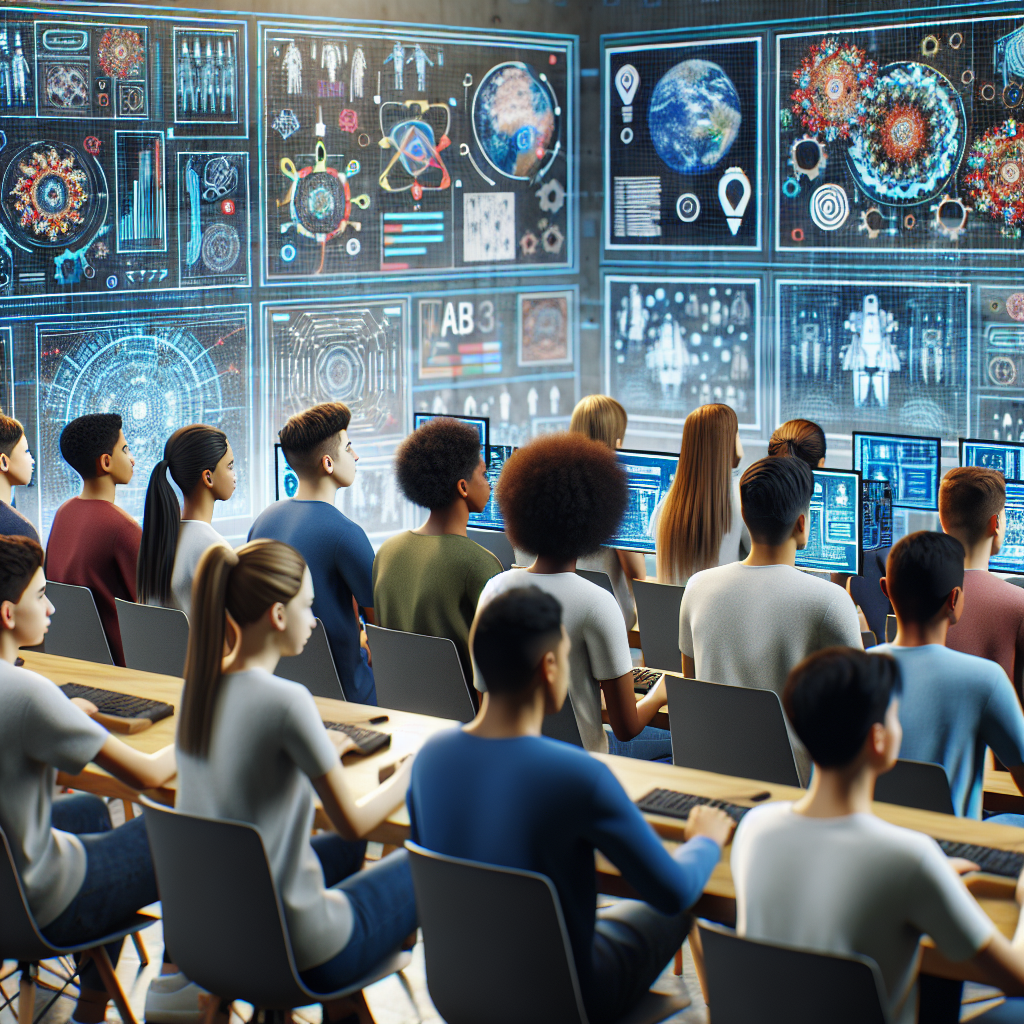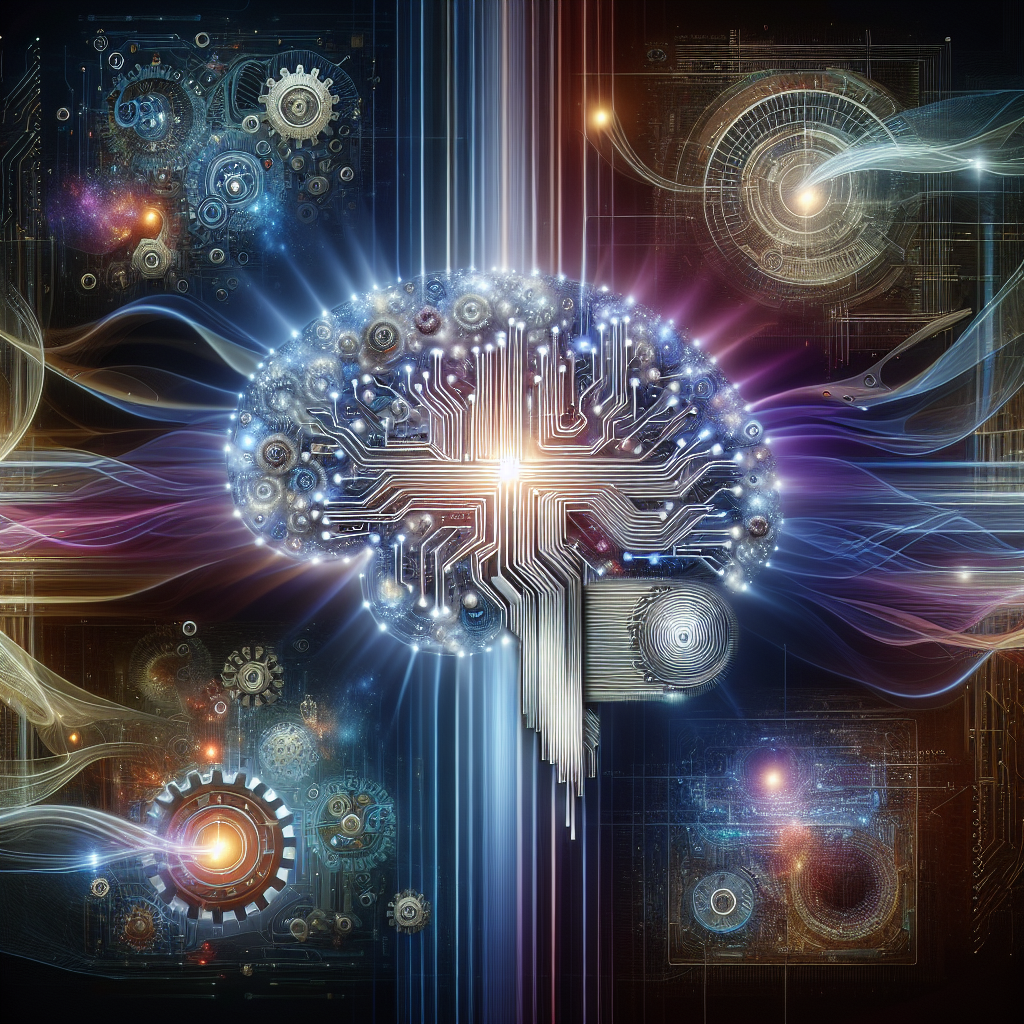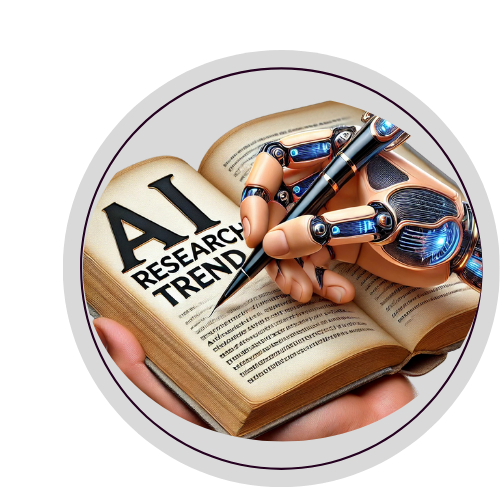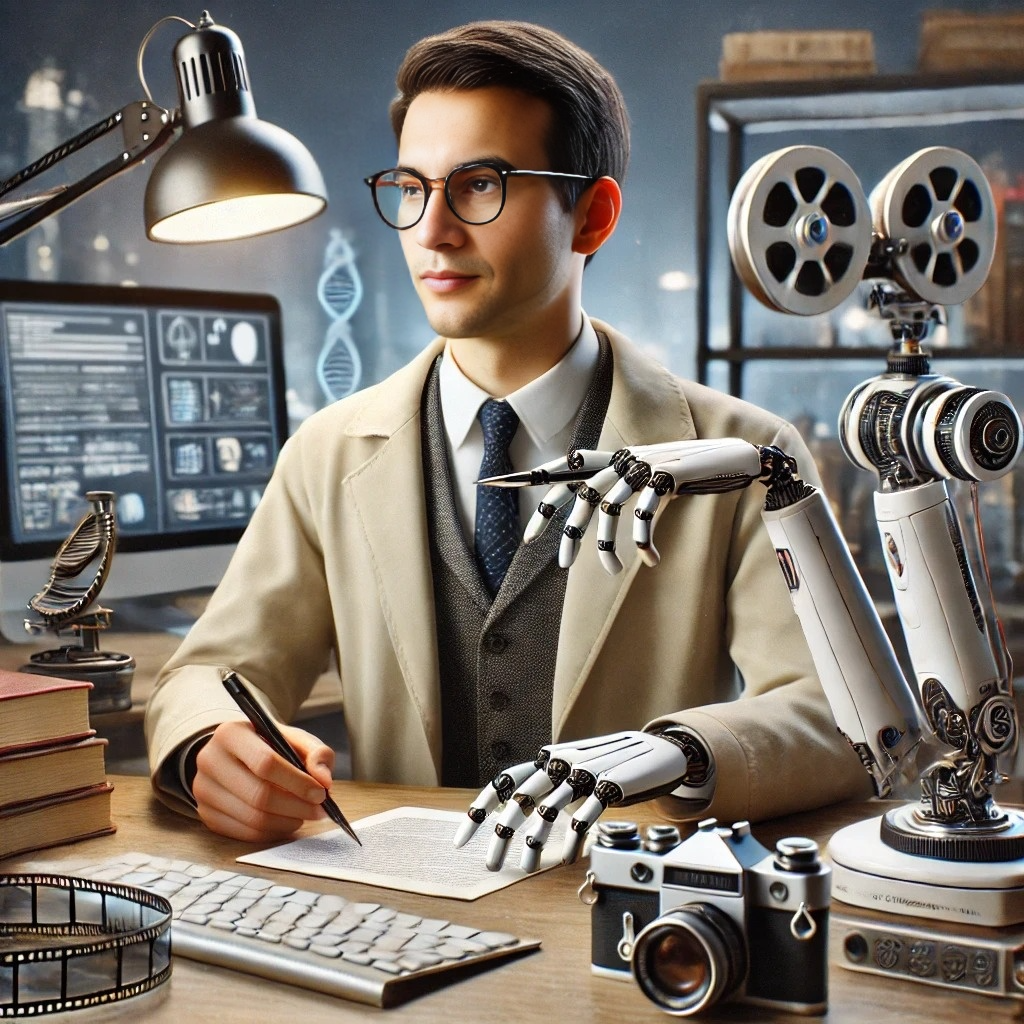Artificial Intelligence (AI) is no longer a concept confined to science fiction. It’s a reality that’s transforming industries and shaping the future.
From healthcare to agriculture, AI is revolutionizing how we operate. It’s enhancing efficiency, driving innovation, and creating unprecedented opportunities.
But what exactly is AI?
At its core, AI is a branch of computer science. It’s about creating machines that mimic human intelligence. These machines can learn from experience, adapt to new inputs, and perform tasks that usually require human intellect.
AI is everywhere.
It’s in the voice assistant on your smartphone. It’s in the recommendation engine of your favorite streaming service. It’s even in the autonomous vehicles that are set to redefine transportation.
Watch to discover how AI is not just a concept from science fiction but a reality with real-world applications and transformative potential.
Table of Contents

But AI’s potential goes beyond everyday conveniences. It’s a transformative force for businesses and industries.
AI can streamline supply chains, making them more efficient and resilient. It can revolutionize human resources, automating routine tasks and enhancing talent acquisition. It can transform customer service, providing personalized experiences at scale.
In marketing, AI can analyze vast amounts of data to glean customer insights. These insights can inform strategi
es, helping businesses reach the right audience with the right message at the right time.
AI is also making waves in various sectors.
In healthcare, AI can aid in diagnostics, develop treatment plans, and even predict disease outbreaks. In manufacturing, it can optimize processes, reduce waste, and increase productivity. In agriculture, AI can monitor crop health, predict yields, and enable precision farming.
AI’s impact on education is equally profound. It can personalize learning, automate administrative tasks, and even predict student performance.
AI is also a powerful tool for environmental monitoring. It can track pollution levels, predict weather patterns, and inform conservation efforts.
But AI’s transformative power comes with challenges.
There are ethical considerations around privacy, transparency, and decision-making. There’s the issue of job displacement due to automation. There’s also the need for robust cybersecurity measures to protect AI systems from threats.
Despite these challenges, the future of AI looks promising.
AI trends for 2024 and beyond point to even more integration of AI in our lives. We’re looking at smarter homes, more sophisticated virtual assistants, and even AI-powered predictive healthcare.
This article will delve into these topics and more. It will explore how AI is transforming industries, the benefits and challenges it presents, and what the future holds.
Whether you’re a business leader, a professional in any industry, or simply an enthusiast, this comprehensive guide will provide valuable insights into the world of AI.
So, let’s embark on this journey to understand how AI is transforming industries and shaping the future.
Understanding Artificial Intelligence and Machine Learning
Artificial Intelligence (AI) and Machine Learning (ML) are often mentioned together but they are not the same.
AI is a broad field. It encompasses various technologies designed to mimic human thinking processes. It’s about building systems that can perform tasks like decision-making, language understanding, and problem-solving.
Machine Learning, a subset of AI, focuses on the ability of machines to learn. It’s a process where computers use data to improve their performance on a task.
ML applications are diverse. From recommendation algorithms to fraud detection, ML drives many AI advancements.
To grasp the basics, let’s break it down:
- Artificial Intelligence (AI): The science of designing machines to carry out tasks that require human intellect.
- Machine Learning (ML): A branch of AI where machines learn from data to enhance functionality.
- Deep Learning: A more complex subset of ML involving neural networks with multiple layers, akin to human brain structures.

One powerful aspect of AI is its adaptability. AI systems can improve their performance over time. They analyze input data, identify patterns, and optimize outcomes.
This adaptability makes AI invaluable in dynamic environments. For instance, in stock trading, AI can swiftly analyze market changes. It can adjust strategies in real-time for optimal trading.
But, AI and ML are not just about numbers and algorithms. Human oversight is vital. Ensuring ethical use of AI requires understanding its limitations. These technologies, while advanced, may replicate biases present in training data.
AI ethics is crucial. It involves ensuring systems operate fairly and transparently. Clear guidelines help prevent misuse and protect user privacy.
The synergy between human intelligence and AI leads to powerful solutions. With AI handling routine tasks, humans can focus on creative and strategic pursuits.
Looking at the near future, the role of AI and ML in technology will only expand. As computing power grows, AI’s capabilities will continue to surprise us.
Understanding AI and ML empowers us to harness their potential responsibly. It allows industries to thrive while maintaining ethical standards. The journey of AI is just beginning, and its implications are boundless.
The Historical Evolution of AI: From Concept to Reality
The idea of artificial intelligence has intrigued humans for centuries. Early myths and stories often featured intelligent automata, reflecting our fascination. Yet, the modern journey of AI began in the mid-20th century.
In 1956, the Dartmouth Conference marked a pivotal moment. It was where the term “artificial intelligence” was coined. Researchers envisioned machines that could mimic human cognition and reasoning.

The 1960s and 1970s saw AI research flourish. Initial enthusiasm was high, with machines demonstrating basic problem-solving skills. However, progress hit a roadblock due to limited computing power and data.
The 1980s introduced expert systems, a significant advancement. These systems used knowledge-based models to solve complex problems. They found applications in industries like medicine and finance.
Despite advances, the 1990s witnessed an AI “winter.” Funding waned due to unmet expectations. AI research faced skepticism, but this phase set the stage for later breakthroughs.
The turn of the century brought renewed optimism. With increased computing power and the internet’s vast data, AI saw a resurgence. Algorithms became more sophisticated, enabling deep learning and neural networks to thrive.
Today, AI’s evolution is marked by continuous innovation. From early dreams to practical reality, AI has transformed our world. It stands as a testament to human curiosity and perseverance in pushing technological boundaries.
AI-Driven Innovation: Pioneering New Frontiers
Artificial Intelligence is the spark igniting the flames of innovation in our modern world. It catalyzes creativity and efficiency across various fields. AI-driven innovation is no longer just a tech trend; it’s a driving force.
Industries leverage AI to produce smarter products and services. For instance, AI helps businesses analyze user data for customization. This personalization leads to enhanced customer experiences and satisfaction.

AI’s ability to process large data sets quickly is unparalleled. It enables research advancements in areas like medicine and climate science. Rapid data analysis facilitates breakthroughs that were once unimaginable.
Key areas where AI-driven innovation is making an impact include:
- Healthcare: Predicting patient needs and personalizing treatments.
- Finance: Enhancing risk management and fraud detection.
- Retail: Streamlining inventory and personalizing shopping experiences.
AI is not just improving existing processes; it’s opening new possibilities. Creative industries like music and art are exploring novel forms of expression. AI tools assist artists in generating unique compositions.
Collaboration between humans and AI results in more robust innovations. Teams can harness AI’s analytical prowess to solve complex challenges. This partnership between man and machine is paving new paths.
As AI technology advances, innovation continues to accelerate. The intersection of AI with other technologies fosters growth. AI’s role in driving innovation ensures its place as a cornerstone of future development.
AI in Business: A Catalyst for Growth and Efficiency
Artificial Intelligence is reshaping business landscapes with its potent capabilities. Organizations are deploying AI to boost productivity and drive growth. By automating tasks, businesses can allocate resources more efficiently.
AI is pivotal in data-driven decision-making. It analyzes vast amounts of information faster than humans can. This capability enables businesses to identify trends and optimize strategies promptly.
AI applications in business span various sectors. Some notable uses are:
- Automating finance operations for accuracy and speed
- Enhancing supply chain processes through predictive analytics
- Revolutionizing marketing by targeting exact customer needs

The advent of AI in business has introduced new efficiencies. AI-powered tools streamline operations, from back-end processing to customer-facing services. This evolution results in cost savings and improved service delivery.
Businesses can leverage AI for competitive advantage. It provides insights into consumer behavior and market dynamics. These insights enable companies to adapt to changing demands swiftly.
Moreover, AI enhances innovation by empowering creative processes. Companies use AI to brainstorm and generate new ideas, driving unique offerings. The speed and accuracy provided by AI are transforming traditional business models.
As AI continues to evolve, its integration into business strategies will deepen. Organizations must embrace AI to stay ahead in the innovation race. AI stands as both a challenge and an opportunity in today’s competitive environment.
AI in Supply Chain Management
AI is transforming supply chain management into a science of precision. It optimizes every step, from sourcing to delivery. AI-powered systems predict demand with high accuracy, reducing waste and costs.
Supply chains are complex networks, often prone to disruptions. AI helps organizations anticipate issues and develop contingency plans. This predictive ability enhances resilience and reliability in operations.

AI’s impact on logistics is profound. It automates scheduling and routing, ensuring timely deliveries. This automation leads to a significant reduction in delays and errors.
Inventory management benefits immensely from AI. Smart sensors and data analysis predict inventory needs. This capability ensures stocks are neither too low nor excessively high.
Businesses adopting AI in their supply chain see improved performance. The precision and agility offered by AI translate into a robust competitive edge. In the future, AI-powered supply chains will be the standard for efficient delivery services.
AI in Human Resources
AI is revolutionizing human resources by streamlining recruitment and management processes. It enhances talent acquisition by automating candidate screening. AI tools sift through resumes quickly, selecting top talents efficiently.
AI also personalizes employee experiences by tailoring training programs. Employees receive customized learning paths aligned with their career aspirations. This personalization fosters higher engagement and productivity.

Employee management sees a transformation with AI’s analytics. AI tools monitor performance metrics and provide real-time feedback. This real-time analysis empowers HR teams to make informed decisions.
Compensation and benefits are optimized through AI data analysis. It provides insights into market trends, ensuring competitive offers. These insights help retain valuable employees and attract new talents.
Moreover, AI addresses workplace equality by eliminating bias in decision-making. It fosters a culture of inclusivity and fairness, driving organizational growth. As AI matures, HR’s role in nurturing human potential will only expand.
AI in Customer Service
AI is redefining customer service with advanced algorithms and automation. Chatbots and virtual assistants provide support 24/7, resolving issues instantly. This immediate response enhances customer satisfaction significantly.
AI systems use natural language processing to understand and respond to queries. They handle a vast array of customer interactions seamlessly. This capability reduces human workload and improves service quality.

AI also analyzes customer feedback to identify service improvement areas. It pinpoints patterns in complaints and suggestions, guiding enhancements. These insights lead to a better-tailored customer experience.
Personalization in customer service reaches new levels with AI. Recommendations are customized based on user preferences and history. This personalized approach fosters customer loyalty and repeat business.
The integration of AI into customer service is not just a trend—it’s a necessity. It elevates service standards and positions businesses as customer-centric. AI’s role in customer interaction is set to expand with technological advances.
AI in Marketing and Sales
AI is a game-changer in marketing and sales, where precision is crucial. It offers profound insights into consumer behavior and market dynamics. These insights guide effective marketing strategies and sales tactics.
AI tools can predict customer preferences and trends accurately. Businesses tailor their campaigns accordingly, maximizing impact. Personalized marketing becomes a reality, boosting engagement and conversion rates.

In sales, AI enhances lead generation and scoring. It identifies prospects likely to convert, streamlining the sales funnel. This targeted approach increases efficiency and reduces acquisition costs.
Additionally, AI enhances customer relationship management. Automated systems track interactions and suggest follow-ups. This automation ensures timely communication, nurturing customer relationships.
As AI continues to evolve, its role in marketing and sales will only grow. It provides an edge in understanding and reaching customers in meaningful ways. For businesses, embracing AI in these areas is key to sustained success.
Sector-Specific AI Applications and Case Studies
Artificial Intelligence transforms various industries through targeted applications. Each sector experiences unique benefits from AI advancements. Understanding these applications helps illustrate AI’s broad influence.
In healthcare, AI enhances diagnostics and treatment plans. It provides precise and timely patient care. In manufacturing, AI improves processes and product quality. It ensures consistent production efficiency.
The agricultural sector sees productivity gains with AI. AI technologies support precision farming and yield maximization. In energy, AI aids in managing resources and predicting maintenance needs. It contributes to sustainability efforts.

Education benefits from AI by offering personalized learning experiences. It adjusts to each student’s unique needs and pace. Environmental monitoring uses AI for real-time data collection and analysis. It aids in sustainability initiatives.
Case studies across these sectors highlight successful AI deployments. They demonstrate AI’s potential in solving complex challenges. Insights from these examples guide future AI integrations and innovations.
AI in Healthcare: Revolutionizing Patient Care
Artificial Intelligence is making significant strides in healthcare. AI systems diagnose diseases with greater accuracy and speed. They analyze medical data to support clinical decisions, reducing errors.
AI-powered tools assist doctors in creating personalized treatment plans. They consider each patient’s unique genetic makeup and health history. This personalization increases treatment effectiveness and patient satisfaction.

AI also monitors patient vitals in real-time through wearable devices. This constant monitoring ensures timely interventions and better outcomes. It transforms how chronic conditions are managed and treated.
Robotics, powered by AI, enhance surgical precision and reduce recovery times. These innovations improve surgical outcomes and patient safety. AI also automates administrative tasks, allowing healthcare professionals to focus on patients.
As AI technologies evolve, healthcare sees ongoing improvements. They promise to deliver a higher standard of care globally. AI’s integration into healthcare systems is vital for future advancements.
AI in Manufacturing: Automating Efficiency
Manufacturing has embraced AI to streamline operations. AI optimizes production lines, reducing downtime and waste. It enhances quality control by identifying defects early in the process.
Predictive maintenance is a significant AI contribution. AI systems forecast machinery failures, preventing costly shutdowns. This foresight ensures continuous operation and reduces maintenance expenses.

AI also enhances inventory management in manufacturing. It predicts material needs accurately, ensuring optimal stock levels. This capability minimizes costs and prevents production delays.
Robotics in manufacturing, guided by AI, improve precision and efficiency. These robots handle repetitive tasks, increasing overall productivity. They also enhance workplace safety by taking on dangerous tasks.
Manufacturers adopting AI reap substantial benefits. They achieve higher output quality and better resource management. AI-driven manufacturing will continue to evolve, bringing further advancements.
AI in Agriculture: Cultivating Precision and Productivity
AI technologies bring precision and efficiency to agriculture. They support crop monitoring and health assessment through drones and sensors. These tools deliver real-time data on soil and crop conditions.
Farmers use AI for predictive analytics, forecasting optimal planting and harvesting times. This prediction boosts yields and resource utilization. It enables smarter farming decisions, increasing productivity.

AI also aids in pest and disease management. Machine learning models identify threats early, allowing prompt action. This capability helps reduce crop losses and improve harvest quality.
Smart irrigation systems, powered by AI, optimize water use. They analyze weather and soil moisture data to manage irrigation precisely. This precision ensures crops receive adequate water without waste.
The agricultural sector witnesses transformative changes with AI. It allows for sustainable practices and higher efficiency. As AI technologies progress, agriculture will continue to benefit from these innovations.
AI in Energy: Powering Sustainable Solutions
Artificial Intelligence is pivotal in the energy sector, driving sustainability. AI systems manage energy distribution efficiently, reducing waste. They optimize power grids by balancing supply and demand accurately.
Predictive maintenance in energy infrastructure is enhanced by AI. It forecasts equipment failures, reducing downtime and repair costs. This maintenance foresight ensures a stable energy supply.

Renewable energy integration is advanced through AI. It manages the intermittent nature of sources like solar and wind. This management ensures reliable and continuous energy delivery.
Smart grid systems use AI for efficient energy distribution. They adjust to consumption patterns in real-time, maximizing efficiency. These systems contribute significantly to reducing carbon footprints.
AI’s role in energy is crucial for future sustainability. It enables the efficient use of renewable sources and minimizes losses. AI-powered energy solutions promise to power a cleaner future.
AI in Education: Personalizing Learning
AI is transforming education by personalizing the learning experience. Intelligent systems tailor educational content to each student’s needs. This customization ensures that students progress at their own pace.
Adaptive learning technologies use AI to identify gaps in understanding. They adjust lessons and materials, addressing weaknesses promptly. This responsiveness enhances the learning process and student engagement.

AI-powered tools aid teachers by automating administrative tasks. They free educators to focus on individualized instruction. This support improves classroom dynamics and educational outcomes.
In online learning, AI enhances accessibility and interactivity. It offers personalized recommendations and resources, facilitating better learning experiences. These improvements make education more effective and inclusive.
The impact of AI in education is profound and continues to grow. It shapes the future of learning by providing flexible and accessible solutions. Education systems worldwide will increasingly rely on AI for enhanced learning experiences.
AI in Environmental Monitoring: A Guardian for the Planet
AI plays a vital role in environmental monitoring, protecting ecosystems. It analyzes data from various sources to monitor environmental changes. This analysis helps in predicting and mitigating ecological impacts.
AI-powered sensors and systems track pollution levels and climate variables. They provide real-time data crucial for decision-making. These insights support efforts to address environmental challenges effectively.

AI also contributes to conservation by monitoring wildlife patterns. It uses satellite data to assess habitats and migration routes. This information aids in the protection of endangered species and biodiversity.
In sustainability efforts, AI optimizes resources like water and energy. It analyzes consumption patterns to reduce waste and improve efficiency. This optimization plays a key role in environmental preservation.
The integration of AI in environmental efforts is crucial for a sustainable future. It provides tools for better managing and understanding natural processes. As AI advances, its role in protecting the planet will expand further.
The Benefits of AI Across Industries
Artificial Intelligence offers vast advantages to various industries. AI enhances efficiency, reduces costs, and drives innovation. These benefits span from healthcare to manufacturing, proving AI’s versatility.
In healthcare, AI improves diagnostic accuracy and treatment timelines. Doctors rely on AI for data analysis to enhance patient outcomes. This technology aids in early disease detection and personalized care.
Manufacturing benefits through predictive maintenance and process optimization. AI identifies potential issues in machinery before they arise. This predictive power reduces downtime and maintains productivity.

AI enhances customer experiences in the retail sector. It personalizes shopping through data-driven insights. Retailers use AI to optimize inventory and understand consumer behavior.
In finance, AI boosts security and decision-making. It detects fraud quickly and provides data-driven investment advice. These capabilities offer higher efficiency and reliability in financial services.
Advantages of AI Include:
- Increased operational efficiency
- Enhanced data analysis and decision-making
- Improved customer personalization and engagement
- Reduced operational costs and resource optimization
- Enhanced safety and predictive maintenance
- Better risk management and fraud detection
- Faster innovation cycles and market adaptation
AI transforms marketing with precise audience targeting and data analytics. Marketers harness AI tools for dynamic advertising and customer insights. This transformation leads to more effective campaigns and better ROI.
In logistics and supply chain management, AI streamlines operations. It aids in route optimization, inventory management, and demand forecasting. These improvements reduce costs and increase speed and reliability.
AI also benefits the energy sector by optimizing resource management. It promotes sustainable practices and enhances grid efficiency. AI systems enable better forecasting and integration of renewable energy.
By driving innovation and efficiency, AI creates new opportunities. It opens new markets and fosters economic growth. As AI continues evolving, its benefits across industries will expand, offering even more transformative potential.
Navigating the Challenges of AI Implementation
Implementing AI brings significant challenges to light. These challenges span technical, ethical, and societal realms. Organizations must address these hurdles to harness AI’s full potential.
One major concern is data privacy. AI systems require vast amounts of data to operate effectively. Ensuring data security while maintaining privacy is crucial.
Developing unbiased AI is another challenge. AI can inadvertently reflect biases present in its training data. This bias impacts decision-making in critical sectors.

Integration with existing systems poses technical difficulties. Many businesses struggle to merge AI with legacy systems. This integration requires time, effort, and financial investment.
AI’s complexity presents another hurdle. Understanding AI technology requires expertise and education. Without proper knowledge, implementing AI effectively becomes difficult.
Key Challenges in AI Implementation:
- Data privacy and security concerns
- Addressing and mitigating algorithmic bias
- Technical integration with legacy systems
- Complexity and lack of understanding
- High costs of AI development and maintenance
- Regulatory and compliance issues
AI’s unpredictable nature can lead to unexpected outcomes. Clear guidelines and protocols must be established. These help in managing AI’s unpredictability.
Finally, regulatory compliance is essential. Adhering to laws and standards is pivotal in AI deployment. Navigating the evolving regulatory landscape poses a constant challenge.
Ethical Considerations and AI Ethics
Ethical concerns remain a pivotal part of AI discussions. AI ethics focuses on responsible and fair deployment. It’s essential to prioritize ethical standards in AI development.
Bias remains a primary ethical issue. AI systems may reinforce or exacerbate existing biases. Efforts to mitigate these biases are crucial for fair outcomes.

Transparency in AI decision-making is another concern. Users deserve an understanding of how AI systems reach decisions. Transparency fosters trust and accountability.
Consent and autonomy are also significant ethical factors. Individuals should control how AI utilizes their data. Preserving personal autonomy is vital in AI interactions.
Fairness extends to access and benefits. AI should not disproportionately favor certain groups. Ensuring equitable access to AI benefits all demographics.
As AI matures, ethical considerations must evolve. Ongoing dialogue and adaptation are necessary. Prioritizing ethics ensures AI serves humanity positively.
AI and Job Displacement: The Changing Workforce
The rise of AI has sparked concern over job displacement. Automation may replace certain tasks traditionally done by humans. This shift poses challenges for the workforce.
AI excels at routine and repetitive tasks. These roles are most susceptible to automation. Industries must adapt to this changing employment landscape.

AI’s impact on employment demands reskilling efforts. Workers need training to thrive in AI-augmented environments. Skills such as critical thinking and creativity gain importance.
The emergence of new AI roles offsets some displacement. Jobs focusing on AI development and management are growing. This shift creates both opportunities and challenges.
Organizations can ease transitions by investing in their workforce. Creating pathways for career development is essential. This investment fosters adaptation and resilience in employees.
As roles evolve, so must societal approaches to employment. Policies supporting lifelong learning are crucial. Embracing change can mitigate AI’s impact on jobs.
AI in Cybersecurity: Safeguarding the Digital Realm
AI plays a critical role in enhancing cybersecurity. It helps detect and respond to threats more efficiently. By analyzing patterns, AI systems identify anomalies and risks.
AI-driven tools automate threat detection processes. This automation improves response times significantly. Quick identification reduces the risk of breaches.

AI models constantly evolve to counter new threats. This adaptability is vital as cyber threats grow in sophistication. Staying ahead of attackers requires proactive strategies.
Integration of AI with human expertise is essential. AI handles repetitive tasks, while experts manage complex scenarios. This balance enhances overall cybersecurity effectiveness.
Challenges include ensuring AI’s reliability in cybersecurity applications. False positives or negatives can lead to security risks. Continuous refinement of AI models is necessary.
Ethical concerns also arise in AI-based cybersecurity. Balancing surveillance and privacy is a delicate task. Developing guidelines ensures both security and civil liberties.
The Future of AI: Trends and Predictions for 2024 and Beyond
The future of AI promises rapid advancements. These developments will reshape industries globally. Experts predict several key trends for AI’s future.
AI’s integration with the Internet of Things (IoT) will flourish. This synergy will enhance automation and efficiency. Devices will communicate seamlessly, creating smarter systems.
Augmented reality and virtual reality will leverage AI. These technologies will offer personalized and immersive experiences. AI will tailor environments to individual preferences.

AI-driven personalization will escalate. Industries will use AI to enhance customer experiences significantly. Retail, marketing, and entertainment will see profound transformations.
Autonomous systems will continue to evolve. Drones, vehicles, and robots will become more autonomous. This evolution will impact transportation and logistics sectors.
Predictive analytics will gain prominence. AI will refine forecasting methods across industries. Improved predictions will aid in decision-making processes.
Here’s a list of key AI trends for the future:
- Enhanced AI-IoT integration
- Growth in AR and VR applications
- Increased personalization across sectors
- Evolution of autonomous systems
- Advancements in predictive analytics
- Expansion of AI in healthcare and education
AI’s role in sustainability will grow. Solutions aimed at reducing energy consumption will emerge. AI will aid in monitoring and conserving resources.
AI governance will also advance. Ethical guidelines and policies will mature. A balanced approach will ensure AI’s beneficial deployment.
AI Trends 2024: What’s on the Horizon?
Looking ahead to 2024, AI’s landscape will continue evolving. Emerging trends will influence technology and society. Businesses must prepare for these upcoming changes.
AI will permeate more aspects of daily life. From home automation to workplace tools, AI integration will increase. This ubiquity will alter both personal and professional environments.

Edge AI will gain traction. Processing data locally will reduce latency and enhance privacy. Industries will benefit from faster, efficient operations.
AI’s role in climate action will expand. Technologies focusing on emissions reduction will develop. AI will support renewable energy transitions and smart grids.
Generative AI models will innovate content creation. They will transform art, music, and writing industries. Creativity will meet machine learning in unprecedented ways.
The healthcare sector will see AI advancements. From diagnostics to patient care, AI will play a crucial role. Emerging applications promise to improve health outcomes.
AI ethics will become a more pressing concern. Conversations around fairness and accountability will intensify. The focus will be on inclusive and unbiased AI systems.
Preparing for the AI Future: Education and Policy
Education will play a pivotal role in AI’s future. Preparing the workforce demands investment in AI literacy. Courses and training programs will cater to evolving needs.
Policy development must keep pace with AI’s growth. Establishing regulations ensures responsible AI deployment. Policymakers will prioritize ethics and transparency in AI applications.

Reskilling and upskilling efforts will become essential. Workers must gain skills compatible with AI technologies. Lifelong learning will foster adaptability and resilience.
Schools and universities will integrate AI into curricula. From STEM subjects to ethics, AI education will be holistic. This integration prepares future generations for AI-driven environments.
Initiatives supporting diversity in AI will emerge. Ensuring representation is essential for fair AI development. Diverse perspectives contribute to comprehensive solutions.
Collaboration across sectors will drive AI advancements. Governments, academia, and industry must work together. Partnerships will facilitate innovation and policy formulation.
SearchGPT and the Evolution of Search Engines
The rise of AI has transformed search engines. AI models like SearchGPT redefine information retrieval. They offer refined, context-aware search capabilities.
SearchGPT analyzes user intent more accurately. It understands nuanced queries and delivers relevant results. This evolution enhances search effectiveness and user satisfaction.

Natural language processing (NLP) is key to SearchGPT. NLP enables interactions in conversational language. Users benefit from a more intuitive search experience.
AI-driven search engines personalize results. They adapt to user preferences and history. Tailored search results improve efficiency and relevance.
SearchGPT’s predictive capabilities anticipate needs. It suggests content even before users complete queries. This foresight streamlines information discovery.
Ethical considerations in search engine AI are crucial. Transparency in algorithms and data handling is essential. Ensuring unbiased results and privacy remains a priority.
Conclusion: Embracing AI for a Smarter Tomorrow
Artificial Intelligence stands as a transformative force. It influences industries, shapes the future, and offers untapped potential. Its role in various sectors cannot be understated.
AI enhances operational efficiency and creativity. Its ability to drive innovation is formidable. Companies leverage AI for strategic advantages and improved outcomes.
From healthcare to entertainment, AI’s impact is widespread. Its applications continue to evolve and expand. Innovations promise to redefine how industries function.

Ethical considerations will guide AI’s journey. Ensuring fairness and transparency is crucial. As AI grows, responsible practices become imperative.
Preparation for AI’s future involves education. Empowering individuals with AI knowledge is essential. This ensures an equipped workforce ready for AI challenges.
AI will remain integral to technological progress. Its growth will be substantial and enduring. Embracing AI positions society for a smarter, more connected tomorrow.


11 thoughts on “Artificial Intelligence AI 1st in Unstoppable Progress”